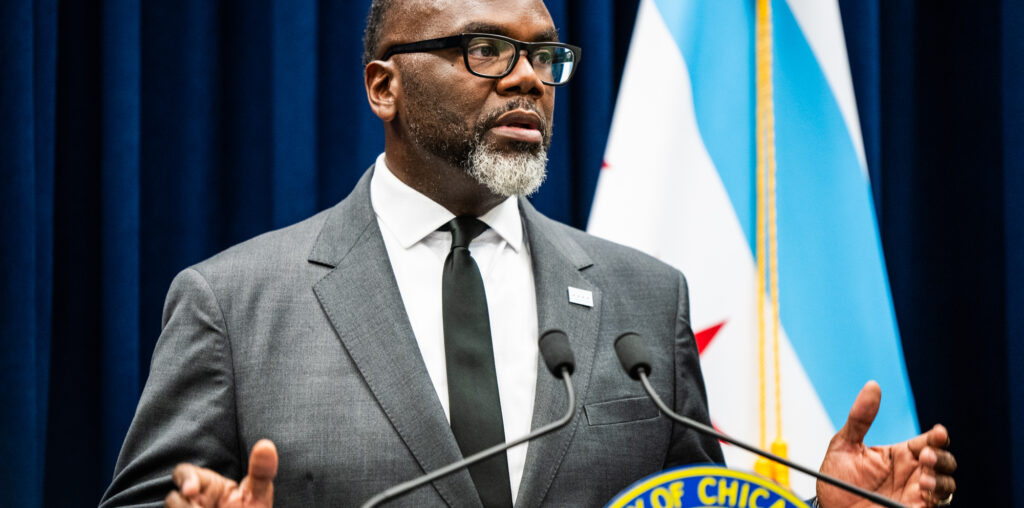CITY HALL — Alderpeople unanimously rejected Mayor Brandon Johnson’s proposed $300 million property tax increase on Thursday as they sought to reset budget negotiations with the mayor’s administration.
Now, Johnson and City Council will have to find some common ground on how to bring in new revenue to close an almost $1 billion budget gap forecasted for 2025.
All 50 alderpeople voted against the property tax hike at a special council meeting Thursday, killing a proposal that Johnson pitched during his budget address just over two weeks ago.
The proposal was a reversal of a major campaign promise by Johnson to not raise property taxes at all during his first term in office.
The $300 million proposal would have meant property owners could expect an around 4.8 percent increase in their annual property taxes. For a house worth $400,000, that would have come out to about $362 more per year, based on 2023 assessments, according to the Mayor’s Office.
But virtually every alderperson has since bristled at the tax hike, with some immediately opposing it while others wanted to wait to hear more about other potential revenue options before making a decision.
Last week, around 30 council members pushed for the special meeting that took place Thursday. Ald. Brendan Reilly (42nd) said widespread rejection of the tax hike has put significant budget power in the hands of alderpeople.

With the $300 million tax proposal facing almost certain defeat this week, Johnson’s budget team met with some alderpeople over the weekend to discuss potential revenue alternatives.
Those include a “significantly reduced” property tax hike, raising the garbage collection fee, using unallocated federal pandemic relief dollars, raising a tax on cloud computing and other proposals, according to the Sun-Times.
The mayor this week tried to recast the original property tax hike as “just a proposal,” and confirmed his administration was working with the City Council on a path forward.
During a press conference on Tuesday, Johnson called himself the “collaborator in chief,” and pledged further negotiations to pass a balanced 2025 budget — which the city is required to do by the end of the year.
“As a public school teacher, sometimes we do things to get people’s attention, and so now that we have the attention of everyone, I’ve said from the very beginning, this is a proposal,” Johnson said. “I’m a collaborative mayor. For the first time in the history of Chicago, you’re actually seeing that type of collaborative approach, and we will continue to engage with City Council.”
Besides the tax hike, Johnson’s original budget proposal relies on a mix of new revenue, a surplus of tax-increment financing dollars, “operational efficiencies” at city departments and the elimination of more than 700 currently vacant city jobs, among other maneuvers.

Alderpeople still differed over how the city should now make up the $300 million tied to the rejected property tax proposal.
Ald. Bill Conway (34th) said after’s Thursday’s vote the budget should include further efficiencies at city departments as well as take advantage of remaining pandemic relief funds.
“In a chamber where we can’t seem to agree on anything, to see the mayor get rebuked 50 to nothing was an unexpected and unbelievable result,” Conway (34th) said. “It certainly forces the Mayor’s Office to come and negotiate with us to find an alternate way to balance this budget.”
Reilly was more explicit in calling for staffing cuts.
“The mayor’s going to have to get over his ideological issues with protecting city jobs,” the Downtown alderperson said. “They’re not entitlements, and when you’re looking at a billion dollar deficit and more than 70 percent of your costs are tied up in personnel, you have to look at that. And I think there’s a way that you can balance this budget by cutting to the bone managerial positions while preserving frontline union representative workers.”
Ald. Carlos Ramirez-Rosa (35th) said Thursday’s vote was a reflection of the “fatigue” of Chicago homeowners, especially in his gentrifying Northwest Side ward.
Going forward, Ramirez-Rosa wants to see state legislators work with the city to find more options to bring in “progressive” streams of revenue, something Johnson has also repeatedly called for. He’d also like to see “waste” cut from the Chicago Police Department, the city’s largest individual department.
“I’ve heard more aldermen this year talk about, ‘Let’s look at the waste in CPD,’” Ramirez-Rosa said. “Obviously, I think we need to revisit what’s happening with the consent decree positions. But outside of that … we really need to look at CPD’s budget and see where we can find savings.”
Ald. Andre Vasquez (40th) said despite Thursday’s vote, he does believe there will still be a smaller property tax increase included in the 2025 budget, in combination with increases to city fees and other efficiencies.
“I think it’s a reality that you’ve got to pay for services, looking at the pension payment debt and what we need to do year over year, that there will be some level of property tax,” he said. “It definitely won’t be $300 million.”
Johnson has repeatedly said he’s opposed to any layoffs or furloughs for city workers, which he reiterated again during a press conference after Thursday’s meeting.
He characterized the unanimous vote against the $300 million property tax proposal as part of a “healthy process” of negotiation and once again referred to himself as the “collaborator in chief.”
“This is something that my administration can handle. I’m not intimidated by voices from individuals who are city leaders in their own respect. So this is a good thing for Chicago. It’s a new process. People will learn to adjust to it as we continue to move forward,” he said.
Listen to the Block Club Chicago podcast:

